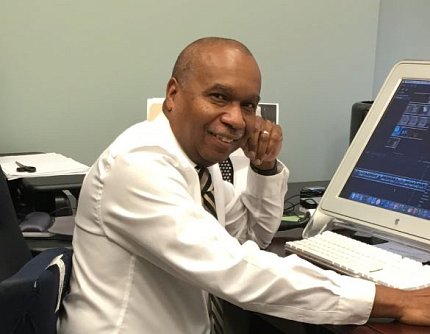That is a Wrap!
Long-Time Comms Leader Jackson Retires

Why is this man smiling? For starters, he retired in December. But throughout his distinguished 35-year NIH communications career, Calvin Jackson often smiled and appeared mysteriously calm, even under tight deadlines. His positive leadership style remained a constant source of inspiration, one of many attributes for which he’ll be missed.
Jackson, deputy NIH associate director for public affairs, had previously served as chief of the News Media Branch in the Office of Communications and Public Liaison, OD, for 8 years. Throughout his career, he produced a variety of NIH audiovisual and other media projects.
“Calvin is remarkable for not only what he accomplished here at NIH, but how he worked with others, which was always with grace,” said John Burklow, NIH associate director for communications and public liaison. “He is one of the kindest, most thoughtful people at NIH.”
“In a place filled with talented and dedicated people, Calvin Jackson stands out,” said NIAID director Dr. Anthony Fauci. “I have had the pleasure of working with Calvin since 1982, and I have always been so impressed with his collegiality, his conscientiousness and his love for this great institution. I will miss him greatly and wish him all the best as he embarks on this exciting new chapter.”
At a retirement party for Jackson, NIH director Dr. Francis Collins noted, “Have you ever seen Calvin get really rattled by anything? I’ve tried really hard, shared my hare-brained ideas at the last minute, but he would always just nod and smile.”
Jackson reflected on a career that not only connected him to valued colleagues but also had impact on the public. “When I think about NIH, who can argue with our mission?” he said. “It doesn’t matter your political affiliation. Everyone wants better health, to live longer and healthier.”
Some stories took him in unexpected directions. About 20 years ago, Jackson produced a radio segment on the lack of minorities on organ and marrow donor registries. The story inspired him to get his bone marrow tested. Two years later, he was a match. He then became the first donor to serve as a board member of the National Marrow Donor Program.
One of his proudest achievements, Jackson said, was completing the ReadyCam studio in Bldg. 31. Researchers and institute directors now can do multiple live broadcasts right from NIH.
Building the studio became more of a hands-on project than Jackson expected. When the project manager left halfway through the job, Jackson quickly had to learn about wiring, carpentry and other facets of building a studio from the ground up.
Another proud feat was LabTV, an effort to collect video vignettes intended to inspire a new generation of scientists; Jackson produced almost 1,000 of them with NIH investigators. “LabTV was one of Calvin’s major accomplishments in recent years,” said Burklow.
Jackson inspired many people through the years with his involvement in NIH’s Management Intern Program. “He’s long been a champion of career development and strengthening diversity in the workforce,” said Burklow.
Dr. Marin Allen, OCPL deputy associate director and long-time colleague, noted, “Calvin has an extraordinary ability to truly listen to what people are saying about their needs and their aspirations, especially young people.”
One of Jackson’s mentees is audiovisual production specialist Woleola “Wally” Akinso. “Calvin often gave me tasks I didn’t think I could handle because he believed in me,” he said. “Calvin’s respect for you makes you want to go the extra mile.”
Upon retirement, Jackson hopes to develop a mentorship program in the Lewes, Del., area where he and his wife now live.
“A lot of kids don’t see college as a viable option,” Jackson said. “I’d like to make college not the exception but what everyone should be aiming for.”
He first came to NIH as a summer intern at the NIH Record. He was a physics major at Tougaloo College in Mississippi but, after writing articles and snapping photos, realized communications might be the career for him. He spent his last 2 summers during college as a writer at NIH’s neurology institute. He was then hired as an editorial assistant at the National Institute on Aging.
“Calvin’s colleagues in the NIH community will remember him as someone who was great—and great fun—to work with,” said Marian Emr, NINDS communications director, who was his supervisor at NIA. “But what will long be remembered is his legacy of quality radio, TV and online programming that tell the NIH story to audiences around the country and the world.”
While working at NIH, Jackson participated in a 6-month internship program at WTTG-TV to get television experience. The station then hired him as an assistant producer for weekend news.
“For 3 years, I worked 7 days a week: here at NIH during the week and at the TV station on weekends,” Jackson recounted. “I loved my time at WTTG but I finally decided I needed a life.”
He then migrated to OD, which started producing a radio program on health for local radio station WGMS-FM.
“What changed my career path was getting into the Management Cadre Program at NIH,” said Jackson. The program introduced him to several OD offices. “It gave me a broader idea of what happens here.”
Colleagues have long been impressed with Jackson’s composure, no matter how hectic the workload. “He’s never annoyed. He never complains,” said Akinso. “I always was impressed by his even-keel leadership style, his humility and his kindness.”
“He’s always cool, calm and collected,” said Burklow. “With Calvin, there’s no drama. I really appreciate that in this line of work. He’s also completely reliable. We’ll miss his positive presence.”
Jackson said he plans to decompress for a while but looks forward to doing more oil painting, a longtime hobby, getting involved with his local church, playing tennis and traveling.
